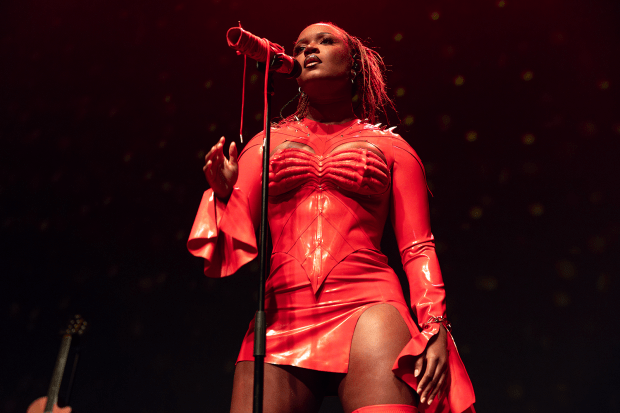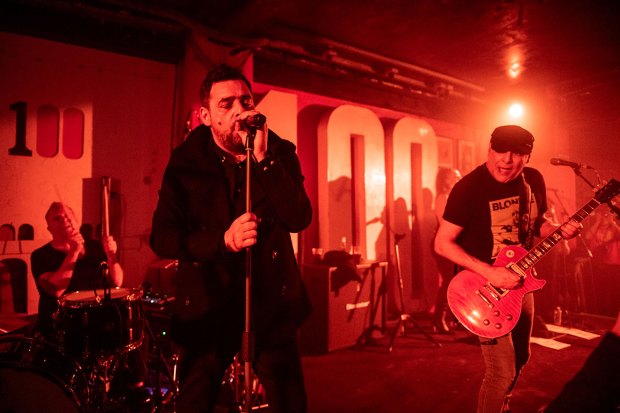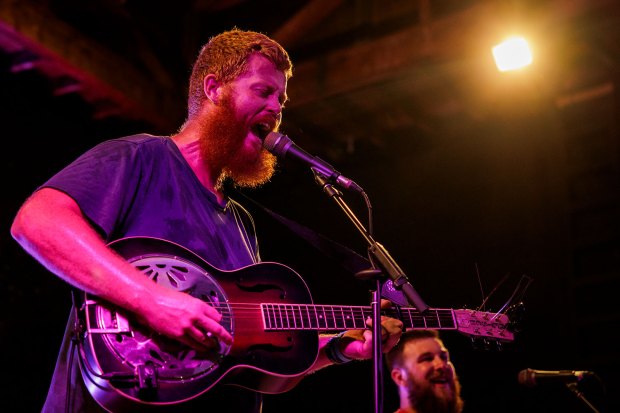Why aren’t Metric stars? In their native Canada, several of their albums have gone platinum, but the rest of the world? Not so much. Twenty-five years after Emily Haines and James Shaw formed the band, here they still are, playing to a not-quite-full Roundhouse to promote their eighth album, Formentera. It was a pretty good turnout – about 3,000 people on a Wednesday night in January – but I doubt anyone ever formed a band thinking: ‘In a quarter of a century, we might be able to not quite fill one of London’s mid-sized venues!’
All of which is a shame because they were flatly brilliant. Their default setting is widescreen, synth-tinged pop-rock, which may be why they never became stars. There was a lot of that stuff around in the first decade of this century, and Metric seemingly lacked the extra spark that lifted the Killers and Paramore into arenas and to the top of festival bills.
But there’s less of it around now – widescreen pop-rock retains its kudos only with those who compile montage sequences for sports broadcasting – which means Metric’s virtues are very much clearer than when every third band was doing something similar: the ferocity of ‘Monster Hospital’; the slinkiness of ‘Gimme Sympathy’; the ambition of the ten-minute opener ‘Doomscroller’, which passed through muted electronica and banging techno and piano balladry before delivering the widescreen pay-off; the pure synthpop of ‘Cascades’.
Perhaps there are practical reasons for their remaining at this level: Haines’s voice is truthful but thin (it sounded as though it had been double-tracked for this show – something big pop acts often do live – but I couldn’t be sure), which means the emotional tone of the vocals rarely changes. And their versatility means it’s hard to ascribe to them any particular single defining feature. Sadly, writing very good songs isn’t enough to take a band to the top.
But Metric really do write very good songs. I made a Spotify playlist of their live set and I’ve been playing it to death. An alternative star of a previous generation once told me that the depressing thing about being in a band isn’t losing fans; it’s staying still and realising you’re playing the same venues on every tour. I’m grateful to Metric for fighting the ennui that must sometimes overcome them as they confront the prospect of flying across the Atlantic for a not-quite-full show; they deserve more.
There are hints that widescreen pop-rock might be coming back. The Australian band HighSchool, who do something similar, have been getting buzzed about, and they shared a bill on Thursday with a trio from Vermont called Thus Love, making their London debut in a grotesquely oversubscribed pub basement. On their debut album, Memorial, you’d peg Thus Love as goths – that ridiculously overtreated guitar tone, that doomy baritone, those portentous song titles: ‘Anathema’, ‘Morality’, ‘Inamorato’. All right, we get it: you’ve got Feelings.
Live, shorn of quite so many effects, they were far tougher and more dynamic, reminiscent of Television or the Wipers, another US post-punk band who never receive the recognition they could. Lu Racine – at least I think it was Lu Racine, because while it’s easy to find the pronouns of the members online (they describe themselves as ‘queercore’), it’s less easy to match each member to their instrument – played guitar urgently and compellingly, letting his lines stretch like spider legs, and the band allowed him the space to do it.
There was an easy confidence about both songs and playing (a little-known American band is likely to be significantly more competent than their British equivalent because they all spend years becoming the best band in their town before anyone notices, whereas here we are willing to seize on and celebrate anyone with half an idea and a penchant for giving good quotes). ‘Repetitioner’ had the kind of skyscraping riff that cries out for bigger surroundings than a tiny, sweaty box; ‘In Tandem’ had the steady chug of drivetime rock but an intensity and focus that was wholly compelling.
Finally, a word for another band in that same sweaty basement earlier in the week (on a night when every third person in the place seemed to be from the music industry): Mary in the Junkyard. Terrible name. Really terrible name. But Clara Freeman-Taylor, who leads the trio, has something: tart, smart songs, spiralling around guitar arpeggios, but never quite falling into the places one expected them to. Worth keeping an eye out for.
Got something to add? Join the discussion and comment below.
Get 10 issues for just $10
Subscribe to The Spectator Australia today for the next 10 magazine issues, plus full online access, for just $10.
You might disagree with half of it, but you’ll enjoy reading all of it. Try your first month for free, then just $2 a week for the remainder of your first year.














Comments
Don't miss out
Join the conversation with other Spectator Australia readers. Subscribe to leave a comment.
SUBSCRIBEAlready a subscriber? Log in